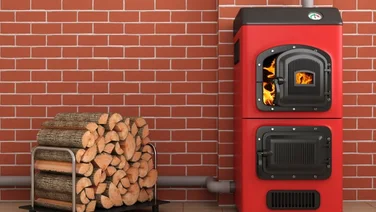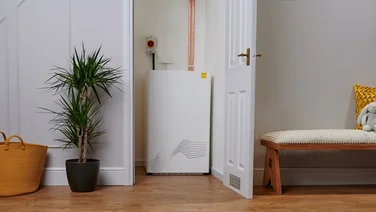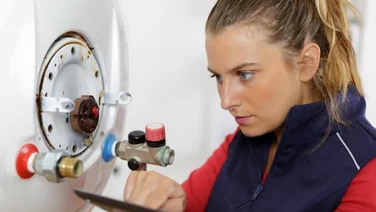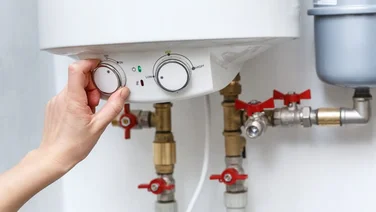We receive a small fee from trusted installers when you request a quote through our site. This helps us keep our content independent, well-researched and up to date – Learn more
✔ We’ve analysed 93 boilers to find the best ones for your home
✔ The Baxi 830 Combi picked up three of our awards
✔ But larger houses should look at getting the Ariston Alteas ONE Net

When it comes to home heating, finding ways to save money and use less energy has never been more important.
The cost of a boiler is obviously a big factor when choosing the right fit for you, but there are other things to consider.
With rising energy bills, and growing concerns about our environmental impact, ensuring that you have the most energy efficient boiler is important, since it’ll lower your energy bills.
Your carbon footprint will also decrease, since you’ll be using less energy to keep your home warm.
We know choosing a new boiler can be difficult, which is why we’ve made this guide.
We run through all the best boilers for your home, in this article, as decided by our tireless research team.
If you want to see how much a top-quality boiler would cost you, just fill in this form to receive free quotes from trusted installers.
Which type of boiler is best for me?
At this point, you’ll probably be asking: which models are the best boilers? How much do they cost? And what size boiler do I need?
But before we get to those important questions, we should take a look through all the types of boilers, so that you’re fully prepared.
You may have an image of a boiler in your head – a large box, usually rectangular or cylindrical, surrounded by pipes and hidden from sight.
They might not look that different on the outside, but depending on the type of boiler you get, you can cut your energy bills and you carbon footprint to varying degrees.
Some are powered by fossil fuels – gas, oil, or Liquid Propane Gas (LPG) – while some run on wood pellets.

There are conventional boilers, which work best in large homes; the system boiler, their best-of-both-worlds cousin; and combi boilers, which can heat you up any time – though not always to the same standard.
All boilers have their advantages and disadvantages, price ranges, and efficiency ratings.
Let’s learn more about some of these differences.
How we chose the best boilers
Our research team scoured the market to find boilers with as many top specs as possible in the following categories: power, range, water heating efficiency, ErP efficiency, decibel level, weight, and warranty.
With a focus on these all-important attributes, we found the 93 best boilers from 12 top brands.
We segmented these boilers into the different categories you’ve seen above, matched them up against each other, and found the best of the best – which we’ve presented here, to you.
Boiler | Best for |
|---|---|
Baxi 830 Combi | Combi |
Viessmann Vitodens 200-W | System |
Ideal Logic Max Heat | Conventional |
Worcester Bosch Greenstar Si Compact | Flats |
Baxi 830 Combi | Houses with 3 bedrooms |
Ariston Alteas ONE Net | Houses with 4+ bedrooms |
EHC Mercury Combi Boiler | Electric |
Baxi 830 Combi | Gas |
Baxi 600 Combi LPG | Oil |
Combi boiler
Unlike conventional system boilers, combi boilers can provide unlimited hot water at a moment’s notice, since they don’t have a cold water tank or a hot water cylinder.
Cold water from the mains goes straight through a heat exchanger, and is quickly heated up and ready to use immediately.

✔ The key advantages of combi boilers is that they only heat the water you use, and so can reduce your energy bills. They’re compact and so are easier to install, especially in smaller homes, and they cam be powered by oil, gas, electricity, or LPG, allowing you to use a one even if you’re not connected to the gas grid.
✘ The main disadvantages of combi boilers is they might reduce your water pressure when your using multiple sources of hot water (taking a shower and washing the dishes), and you won’t have a reserve of hot water if the boiler breaks down, since combi boilers don’t have a water tank. They also don’t work well with solar panels – at least compared to the other main types of boilers – which reduces your ability to easily cut your carbon emissions.
Conventional boiler
Also known as regular or heat-only boilers, conventional boilers typically require two tanks: a cold water tank, which draws water from the mains and distributes it, and a feed and expansion tank, which keeps your water levels consistent.
The water is heated by your boiler whenever you choose, and stored in a hot water cylinder.
✔ The main advantage of conventional boilers is that they can supply hot water to three or four bathrooms with no trouble and no reduction in water pressure, making them ideal for larger homes. They also combine well with solar panels, and you can fit the cylinder with an electrical immersion heater as a failsafe if the boiler breaks.
✘ The main negative conventional boilers take up a lot of space, and are typically only suited to homes with unused lofts. Because of their size, they’re more difficult and costly to install than other heating systems. They also don’t provide hot water 24/7, so you need to pre-plan when you want water to be heated.
System boiler
System boilers take their water supply directly from the mains, like a combi, then heat it up and store it in a hot water cylinder, like a conventional boiler.
This means there’s no need for an extra couple of tanks in your loft, which saves on space, but you’ll still have a higher capacity than combi owners.
If you need hot water for two bathrooms, rather than three or four, a system boiler might be the way to go.
✔ The best news when it comes to system boilers is that their water pressure is consistent, without you having to make the space in your home for two water tanks. They’re also compatible with power from solar panels, which is always a great option.
✘ The worst news is a repeat of the drawbacks of having a conventional boiler: a system boiler takes up more space than a combi, you have to heat the water up in advance, and the hot water can run out.
Condensing boilers
If a boiler is condensing, that means it has a Flue Gas Recovery System. Instead of releasing waste gases into the atmosphere, the recovery system captures them, so that the boiler can generate as much heat as possible, using what would otherwise have been wasted.
In 2007, the law was changed to require all new boilers to be condensing, so any new boiler you buy today, whether it’s a combi or a conventional boiler, should have a condensing feature.
✔ A big pro of condensing boilers is that they’re more environmentally friendly and more energy efficient than older models, and will save you money on your bills.
✘ The only real con is that the pipe which goes from the boilers to the outside can freeze over in very cold temperatures, and stop the boiler from working.
Gas boilers
These boilers use a gas supply to heat water which is either instantly sent to act as central heating or warm water, or stored in a hot water tank for later use.
Gas boilers come in pretty much every mainstream variety, and are the most popular type of boiler.
✔ Their main advantage is that they’re easy to install in the majority of properties, since most are already connected to the gas grid.
✘ A big downside is that they’re not environmentally friendly, since they burn gas, a high-emission fossil fuel. They’re also set to be banned in newly built homes from 2025, and phased out from all homes in the coming decade. Find out if you need to take action by checking out our guide to the UK gas boiler ban.

Oil boilers
Oil boilers use a heating oil – typically gas oil or kerosene – to heat a container of water, either directly from your mains or in a storage tank.
They’re mainly used in homes that aren’t connected to the gas grid, and as of 2021, only 1% of UK homes use oil for heating.
✔ The main advantage of oil boilers is that they can heat homes that aren’t connected to the gas grid, and they’re roughly as efficient as gas boilers.
✘ Their main drawback is that they’re terrible for the environment, releasing up to seven times as many milligrams of damaging nitrogen oxides into the atmosphere as gas boilers. They also require a storage tank to hold all the oil, and regular deliveries of oil to keep running. Oil isn’t easy to acquire at short notice, either, so you’ll have to plan ahead.
Wood-burning boilers
If you don’t have a gas grid connection, you can use firewood to heat your home and water.
This method works best if you aren’t connected to the gas grid, and have a ready supply of trees just waiting to be cut down and used for fuel. You can also buy wood logs from a supplier.
Wood-burning boilers can be better for the environment that gas boilers, since they don’t produce C02 emissions. However burning wood creates smoke which can make air pollution in your local area worse.
✔ The main advantage of wood-burning boilers is that they’re cheaper to run than gas boilers, with wood not being subject to the same price fluctuation as gas and electricity.
✘ The main disadvantage is that wood-burning boilers require a large storage space for the logs, which are usually stored outside, and you’ll have to make sure you have a large enough supply of wood to last you through the winter.

Biomass boilers
Biomass boilers work in much the same way as any other, except they usually run off wood pellets or chips.
The process of refueling the boiler can sometimes be automated, saving you from having to do it yourself every time you want a quick shower.
✔ The main upside of biomass boilers is that you can get paid for using one, under the government’s Domestic Renewable Heat Incentive, which pays homeowners potentially thousands of pounds for using renewable energy.
✘ The downside is that the pellets needed to fuel your boiler can be expensive. As with wood-burning boilers, you’ll also need somewhere to store the pellets, regularly top up your supply, and be wary that your biomass boiler can also contribute to local air pollution.
Electric boilers
Electric boilers function like a combi gas boiler, except they use your pre-existing electricity source to heat your water and home instead.
✔ This is a big plus, since it means that electric boilers are more environmentally friendly than almost all other types of boilers. Plus, if your electricity already comes from renewable sources like solar or wind, you won’t be adding carbon emissions with your boiler.
✘ On the downside, electricity is more expensive source of heat than gas, which means they cost more to run. They can also be slightly more noisy than gas boilers.
What are the best boilers?
We’ve selected the best boilers for a variety of needs. Find them all listed below, along with a breakdown of their ratings and features.
Best combi boiler: Baxi 830 Combi

Baxi’s star boiler has won three of our nine awards, triumphing in the combi, three-bedroom house, and gas categories – and it’s easy to see why.
Firstly, its 89% water heating efficiency rating is the highest around.
That means there’s no machine on the market that’ll supply you with more hot water from the same amount of energy.
You’ll also receive a 10-year warranty if it’s installed by a Gas Safe-registered engineer – and at 48 decibels, its machinations are quieter than a moderate rainfall.
Get it fitted, then forget about it. Perfect.
This range also offers a variety of outputs, including a 36 kW model that’s able to serve a house with four or more bedrooms.
Best system boiler: Viessmann Vitodens 200-W

When it comes to gas boilers and system boilers, 94% efficiency is the best we can achieve at the moment – and the Vitodens 200-W hits it on the nose.
This rating will allow you to heat your home while paying less than you would with almost any other boiler.
It describes your boiler’s efficiency when it comes to circulating heat around your home, as opposed to water heating efficiency ratings, which measure combi boilers’ ability to heat water.
You also won’t find a quieter gas-powered system boiler, with Viessmann’s model hovering around the noise level of a hushed library.
The only major drawback is you’ll receive a warranty lasting just three years – or five, if you hire a Viessmann installer.
Best conventional boiler: Ideal Logic Max Heat

If you don’t fancy converting your conventional boiler – which is also known as a regular, heat-only, or open vent boiler – the Logic Max Heat is a fantastic upgrade.
It hits the industry-wide ceiling of 94% efficiency, and does so without fuss, weighing just 22.7 kg and producing just 47 decibels – a hum you’ll tune out after a couple of days.
This Ideal machine also comes in a range of output levels, so whether you live in a flat or three-bedroom house, you can get a version that’ll meet your needs.
And if anything does go wrong with the Logic Max Heat, you’ll have a 10-year warranty to fall back on, as long as you got a Gas Safe-registered engineer to install it.
Best boiler for flats: Worcester Bosch Greenstar Si Compact

Worcester Bosch took this award by giving consumers exactly what they need from a boiler: solid fundamentals and spectacular extras.
The Greenstar Si Compact is light and small enough to be hidden away – which is important in a flat – but its most impressive qualities relate to its performance.
A score of 86% for water heating efficiency and 94% on ErP (energy-related products) efficiency is unbeatable in this size category, and means you can look forward to lower bills and warm showers at the double.
The Baxi 224 Combi 2 has a better water heating energy efficiency rating than this model, and came close to taking the award, but was let down by its paltry two-year guarantee.
Baxi will only give you a lengthy warranty if you buy one of its large boilers, leaving anyone who lives in a flat to cross their fingers for the majority of their boiler’s lifespan.
In contrast, you can get a five-year warranty as standard with the Greenstar Si Compact, rising to 10 years if you get it installed by a Worcester Bosch engineer.
Best boiler for houses with 3 bedrooms: Baxi 830 Combi

Here it is again: the star boiler.
As mentioned above, it comes with a market-leading water heating efficiency score and an excellent ErP efficiency rating – plus a 10-year warranty if you get it installed by a Gas Safe-registered engineer.
But if you don’t already have a combi in your three-bedroom home, you may not want to go through the expensive process of converting it to a combi.
If you want to stick with a system boiler, we’d recommend you choose our best system boiler winner, the Viessmann Vitodens 200-W.
And if you feel the same way but have a conventional boiler, go for a Vaillant ecoTEC plus 430. It’s the best option for three-bedroom households.
Both machines have an ErP efficiency of 94%, so with either of them, you can rest safe in the knowledge that your boiler is keeping your bills as low as it can.
Best boiler for houses with 4+ bedrooms: Ariston Alteas ONE Net

When it comes to larger homes, the Ariston Alteas ONE Net can’t be beat.
This boiler has top-notch efficiency scores, enough power to comfortably heat a house with four or five bedrooms – and it’s light enough that your installer won’t throw their back out.
Plus it comes with a 12-year warranty – the longest offered by any of our winning boiler brands – and you don’t even have to use an Ariston installer to get this level of cover.
Worcester Bosch’s Greenstar 8000 Style Combi was extremely close to pipping the Alteas ONE Net to this award, but Ariston’s lengthy, no-strings warranty put it over the top.
Best electric boiler: EHC Mercury Combi Boiler

With electricity prices staying high, it’s important to pick the best electric boiler, to ensure your bills stay as low as possible.
Enter the Electric Heating Company’s Mercury Combi, which comes with an efficiency rating of 100%, can provide heat to a three-bedroom house, and does it all at the sound level of a whisper.
It’s also one of the smallest, lightest machines around right now, which means you can hide it away wherever you want.
You’ll also get a five-year warranty as standard, which is decent.
Best gas boiler: Baxi 830 Combi

The Baxi 830 wins its third award in style.
The best gas, combi, and three-bedroom house boiler has the highest water heating efficiency you’ll find, along with a world-class ErP efficiency rating and a relatively low weight.
The Baxi 800 range also goes as low as 25 kW – which would suit a large flat – and as high as 36 kW, which is perfect for a typical four-bedroom house.
And if you’ve read the whole article up to this point, you know this elite model comes with a 10-year warranty, if you have it installed by a Gas Safe-registered engineer.
Best oil boiler: Baxi 600 Combi LPG

Baxi’s 600 Combi LPG model has hands-down the best water heating efficiency in its category, as well as a superb ErP efficiency score.
This machine is also the quietest in its category, and weighs up to five times less than other models with similar power outputs.
It’s perfect for the average three-bedroom house, and the range caters to flat owners too.
Unfortunately, as Baxi offers less to smaller households, this model only comes with a seven-year warranty, not the 10-year guarantee you’d get with the Baxi 830 – but seven years is still pretty good.
If you’d rather get a conventional oil boiler than a combi, look instead to Grant’s Vortex Pro: External, which has a market-leading 94.56% ErP efficiency rating.
It emits 54 decibels, meaning it’s quieter than a typical dishwasher – and since it stays outside, you’ll probably rarely ever hear it.
Make sure you get an installer to do all the heavy lifting, though, because at 162 kg, this behemoth of a machine weighs as much as two average adults.
And if you’re after a system oil boiler, pick the Greenstar Danesmoor System Utility. Its ErP efficiency rating is 94%, and its 18/25 kW design means it can heat either a flat or a three-bedroom house.

The cost of heating your home, particularly during the colder winter months, makes up about 60% of energy bills.Make sure you’re not ramping up your energy bills by holding on to your old boiler — fill in this short form to get a quote from one of our many professional installers.
Summary
By now, you should have a better idea of which boiler will be best for your needs.
All that’s left is to find out how much it will cost. The best way to do that is to get multiple quotes from boiler installers.
Fortunately, we can help with that as well.
To receive free, bespoke quotes for a top-quality boiler from trusted installers, just fill in this form.









